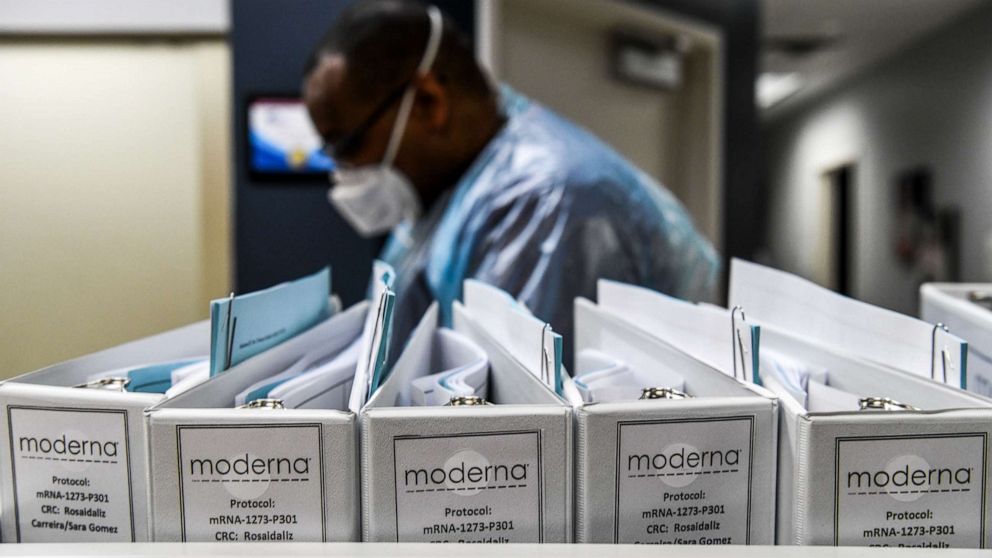


In another promising medical development, the biotechnology company Moderna has announced its COVID-19 vaccine could be up to 94.5% effective.
The news comes a week after Pfizer announced its vaccine could be up to 90% effective based on a similar, early analysis from its Phase 3 trial.
In a release Monday, Moderna said its Phase 3 trial "met statistical criteria with a vaccine efficacy of 94.5%," according to an early analysis of the data that included 95 participants with confirmed cases of COVID-19.
MORE: A Black participant in Moderna's COVID-19 vaccination trial: Trust the vaccineHowever, vaccine specialists caution that these numbers are not set in stone -- both estimates could increase or decrease as the respective trials continue, and the vaccines may ultimately prove to work better in some groups than in others.
For Moderna President Stephen Hoge, the similarly high efficacy numbers underscore the real potential of mRNA vaccines -- a new type of vaccine technology used by both companies.
MRNA technology, is "a really exciting new way to try to prevent disease," Hoge told "Good Morning America."
Despite the promising data, Moderna isn't ready to roll out its vaccine in a mass immunization campaign just yet. The company will first need to ask the Food and Drug Administration for emergency use authorization (EUA), a limited green-light for higher-risk groups.
The company said it plans to seek EUA "in the coming weeks." That application will include at least two months of safety data after the last injection in half the volunteers.
Moderna has said it expects the FDA application will include the "final analysis" of 151 cases of COVID-19 in its trial, rather than just the initial 95 cases.
This puts them roughly on track along with Pfizer for possible limited authorization by the FDA as soon as December. Moderna is expected to have 20 million doses to go along with Pfizer's 50 million for global distribution before more can be made in 2021.
Vaccine specialists say that ongoing vaccine trials are moving at an accelerated pace because of the rapidly rising number of new infections in the country.
These large, Phase 3 trials only reach their key milestones once a certain number of patients in the trial become infected with COVID-19. With a pandemic raging, companies are more likely to quickly find an answer about whether the vaccines work or not.
MORE: Government partners with Moderna to make 100M vaccine dosesModerna also announced promising data Monday about how the vaccine can be shipped and stored. According to the company, the vaccine can safely be stored for up to six months in a normal freezer, and up to 30 days in a normal refrigerator.
"I think a big difference between our vaccine and the Pfizer vaccine ... is that our vaccine appears to be able to be distributed in much more traditional infrastructure," Hoge said.
Pfizer's vaccine must be kept at around -94 degrees Fahrenheit -- far colder than a typical freezer can accommodate. Because of these temperature requirements, the company will ship vaccine doses in special temperature-controlled thermal boxes packed with dry ice.
With the new data published this week, Moderna could be the second company to seek authorization in the United States, after Pfizer.
MORE: Pfizer says COVID-19 vaccine is looking 90% effectiveModerna received funding for its clinical research from Operation Warp Speed, and has partnered with the National Institutes of Health on its trial. Pfizer opted to go it alone, not accepting government funding for its clinical research from Operation Warp Speed but rather inking a deal to supply the government with 100 million doses for $1.95 billion, assuming the vaccine is FDA authorized.
Other companies are not far behind Moderna and Pfizer. Two other companies that received funding for clinical research from Operation Warp Speed -- AstraZeneca and Johnson & Johnson -- had brief setbacks when their late-stage trials were paused over safety concerns. But those trials are now back up and running and may have data available in early 2021.
Operation Warp Speed's chief advisor, Dr. Moncef Slaoui, told ABC News that if everything continues to go according to plan and there are no major scientific or manufacturing delays, most Americans could have access to a COVID-19 vaccine by spring 2021, and possibly be immunized by June.
"Vaccines really are on the horizon," said Hoge. "It does feel like we are closer to the end than we are to the beginning. In the coming months, vaccines [will] start to become available to those Americans who need them, and eventually to all Americans who want them."
This report was featured in the Tuesday, Nov. 17, 2020, episode of “Start Here,” ABC News’ daily news podcast.
"Start Here" offers a straightforward look at the day's top stories in 20 minutes. Listen for free every weekday on Apple Podcasts, Google Podcasts, Spotify, the ABC News app or wherever you get your podcasts.